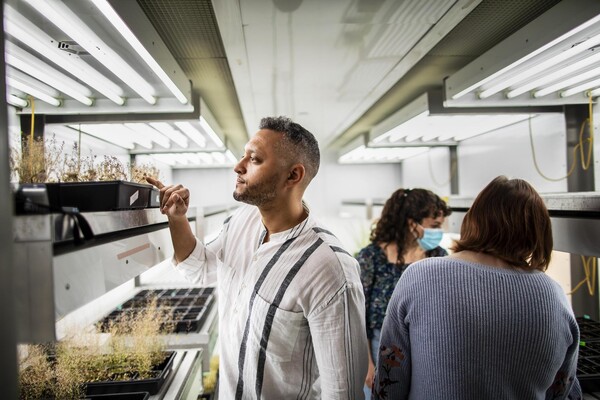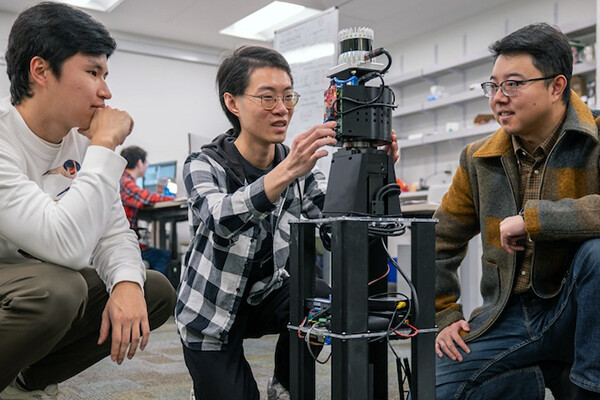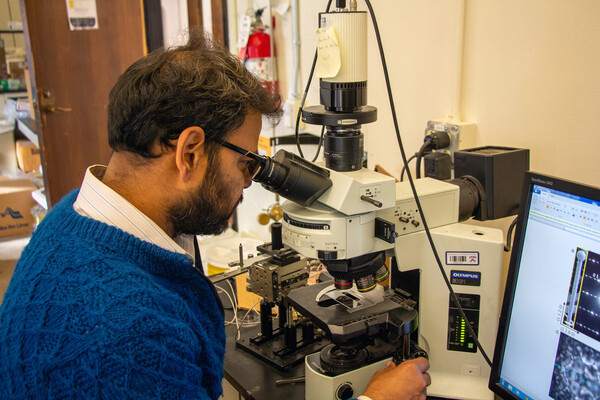11/15
Science & Technology
Penn Opens Center for Particle Cosmology to Study Early Nature of the Universe
MEDIA ADVISORY & PHOTO OPPORTUNITYWHAT:
Penn Alum to Discuss Life Aboard Space Station
MEDIA ADVISORY & PHOTO OPPORTUNITYWHO:
Solar Energy: Materials, Challenges, and Breakthroughs at the Penn Energy Research Group Symposium
MEDIA ADVISORY & PHOTO OPPORTUNITYWHAT:
450 Grade Schoolers Build Lego Robots, Study Climate Change at Penn Engineering's First Lego League Tourney
MEDIA ADVISORY & PHOTO OPPORTUNITYWHAT:
It's The Network: Penn Researchers Examine Behavior, Consensus Building Influenced By Network Structure
PHILADELPHIA –- A team of computer scientists at the University of Pennsylvania investigating the political, social and economic struggle between individual self-interest and the need to build a consensus have learned that, depending only on the structure of the network of participants, they can engineer surprising experimental results.
Brain Structure Assists in Immune Response, According to Penn Vet Study
PHILADELPHIA –- For the first time, a team of researchers at the University of Pennsylvania School of Veterinary Medicine have imaged in real time the body’s immune response to a parasitic infection in the brain.
Just Living With Females Extends the Reproductive Life of the Male Mouse, Says Penn Veterinary Researcher
PHILADELPHIA –- Living with a female mouse can extend the reproductive life of a male mouse by as much as 20 percent, according to a study conducted by Ralph Brinster and a team of other researchers at the University of Pennsylvania School of Veteri
Embryonic Heart Cells Thrive Only in an Environment That's Just Right, Penn Study Says
PHILADELPHIA –- Cellular engineers at the University of Pennsylvania have determined that cardiomyocytes, the specialized cells that form the heart muscle, thrive when cultured in an environment that mimics their own elastic nature but falter, weaken or die when “grown” on stiffer or softer materials.
Penn Veterinary Researcher Tracy Bale Receives Career Development Award from Society for Neuroscience
PHILADELPHIA –- Tracy Bale of the University of Pennsylvania has received a 2008 Career Development Award from the Society for Neuroscience.
In the News
Climate policy under a second Trump presidency
Michael Mann of the School of Arts & Sciences discusses how much a president can do or undo when it comes to environmental policy.
FULL STORY →
Superhuman vision lets robots see through walls, smoke with new LiDAR-like eyes
Mingmin Zhao of the School of Engineering and Applied Science and colleagues are using radio signals to allow robots to “see” beyond traditional sensor limits.
FULL STORY →
A sneak peek inside Penn Engineering’s new $137.5M mass timber building
Amy Gutmann Hall aims to be Philadelphia’s next big hub for AI and innovation while setting a new standard for architectural sustainability.
FULL STORY →
Exxon CEO wants Trump to stay in Paris climate accord
Michael Mann of the School of Arts & Sciences voices his concern about the possibility that the U.S. could become a petrostate.
FULL STORY →
Amid Earth’s heat records, scientists report another bump upward in annual carbon emissions
Michael Mann of the School of Arts & Sciences says that total carbon emissions including fossil fuel pollution and land use changes such as deforestation are basically flat because land emissions are declining.
FULL STORY →
How can we remove carbon from the air? Here are a few ideas
Jennifer Wilcox of the School of Engineering and Applied Science and Kleinman Center for Energy Policy at the Weitzman School of Design says that the carbon-removal potential of forestation can’t always be reliably measured in terms of how much removal and for how long.
FULL STORY →
California air regulators approve changes to climate program that could raise gas prices
Danny Cullenward of the Kleinman Center for Energy Policy at the Weitzman School of Design says that many things being credited in California’s new climate program don’t help the climate.
FULL STORY →
Self shocks turn crystal to glass at ultralow power density: Study
A collaborative study by researchers from the School of Engineering and Applied Science has shed new light on amorphization, the transition from a crystalline to a glassy state at the nanoscale.
FULL STORY →
U.S. achieves billion-fold power-saving semiconductor tech; could challenge China
A collaborative effort by Ritesh Agarwal of the School of Engineering and Applied Science and colleagues has made phase-change memory more energy efficient and could unlock a future revolution in data storage.
FULL STORY →
Climate scientists fear Trump will destroy progress in his second term – and the outcome could be ‘grim’
Michael Mann of the School of Arts & Sciences says that a second Trump term and the implementation of Project 2025 represents the end of climate action in this decade.
FULL STORY →






